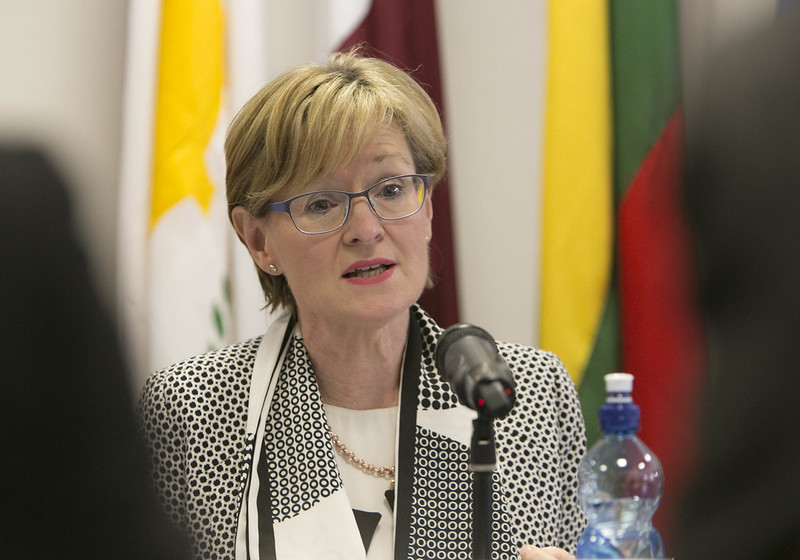European commissioner Mairead McGuinness was given a predictably tough time by members of the European Parliament yesterday as she defended the EU executive‘s decision to label gas and nuclear energy as sustainable, at one point stating: “I would rather we didn't have to invest in gas at all.”
The commissioner for financial stability, financial services and the capital markets union was making the case for time-limited use of the controversial energy sources as part of the energy transition and said both would be needed to keep the lights on and that the strict rules laid down for their definition as “transition technologies” would be better than leaving investors and the markets to play by their own rules.
“Investment, public and private, into gas and nuclear, will continue for the time being,” McGuinness told members of the parliament's economic and environmental committees. “It is, in my view, better that we guide that investment and place it within very strict criteria to govern the transition than to leave it to the market, without constraints or timelines.”
Requirements
The commissioner was referring to rules laid down in the complementary delegated act (CDA) drafted by the executive which stipulate any gas project investment will only be considered sustainable if the infrastructure switches to clean or “low-carbon” gas by 2035 at the latest, and which calls for strict measures on nuclear waste.
Dutch Green Party MEP Bas Eickhout pointed out “low-carbon” gas could still refer to natural gas, as long as it was fitted with carbon capture and asked, of the proposed requirement new nuclear plants have a waste plan in place by 2045: “How can that relate to ‘do no harm?'” in reference to the requirement that EU policy do no significant harm to the bloc's environment or its climate goals.
The argument made by McGuinness about the need to guide investors, however, was undermined by her repeated statements the taxonomy is not a mandatory measure, with the Fine Gael party member saying: “We don't force anyone to use it, this is not energy policy, this is not a mandatory statement of what you have to do.
Climate goals
Replying to charges the commission was telling investors the energy sources are green, McGuinness said: “I do not regard gas and nuclear as green.” She had earlier attempted to stress the time-limited usefulness of gas and nuclear by saying: “The CDA is about alternatives that aren't sustainable but, by following strict rules, can make a much bigger contribution to our climate goals.”
The commissioner came under fire for refusing to heed the recommendation made by its own advisory body, the Platform on Sustainable Finance, not to include gas and nuclear in its sustainable investment taxonomy. Dutch Labour Party MEP Paul Tang said: “You've ignored the science-based advice of the sustainable finance platform. You've ignored and insulted the European Parliament by choosing the back door of a delegated act rather than the front door of primary legislation. Even loyal European member states like Luxembourg and Austria are willing to go to court [to block the CDA]. You've destroyed the science-based standard, you've failed to find a political compromise, and you've insulted European institutions and democracy. And, may I add, your timing is spectacularly lousy.”
It was a theme that German MEP Michael Bloss, of the Alliance 90/The Green party warmed to when he stated: “You said you don't want to insult the parliament but the parliament voted to exclude nuclear from the taxonomy and now you're putting nuclear into the taxonomy via a delegated act. How is that not disrespecting a decision taken by the parliament?”
Popular content
Slovak MEP Martin Hojsík, a member of the Renew Europe group, said: “In central and Eastern Europe, where I'm from, countries have been pushing for [the inclusion of gas and nuclear in the taxonomy]. It's basically a politically-based decision, let's be honest, it's not a science-based decision.” Petros Kokkalis, of Greek party Syriza, returned to the rejection of the advice offered by the Platform on Sustainable Finance, saying: “You said the platform is scientists but then you said: ‘we have our own scientists.'” He concluded by asking how there could be two scientific truths.
“This is science-based,” McGuinness said of the CDA, “there's always a political part of decision making, I think that's how we operate … but it is science based.”
Coal
Bogdan Rzońca, of Poland's Law and Justice Party, suggested non-Russian coal, gas, and oil could help Europe through its energy crisis but McGuinness, responding to a question from Finnish MEP Nils Torvalds about whether Russian gas, Australian coal, or Finnish peat were dirtier, said: “You hear now about countries debating reopening more coal, burning more coal, this is something that none of us want to see.
Swedish Social Democrat Jytte Guteland said the debate over energy sources was not about keeping the lights on, as McGuinness had suggested, but “about whether we should sit [on Russian president Vladimir] Putin's knee many years from now.”
In response, the Irish commissioner refused to name the Russian leader.
The European Parliament has until July 9 to decide whether to carry out the threat made by Spanish Socialist Workers' Party member César Luena, who said: “If you don't withdraw this CDA, we will vote against it.”
That July deadline can be extended by two months, if necessary.
This content is protected by copyright and may not be reused. If you want to cooperate with us and would like to reuse some of our content, please contact: editors@pv-magazine.com.



Has someone looked at asset life times and development times for such projects? Investments in those “bridge technologies” are going to have their prime time roughly 20 years after these technologies are supposed to be extinct.